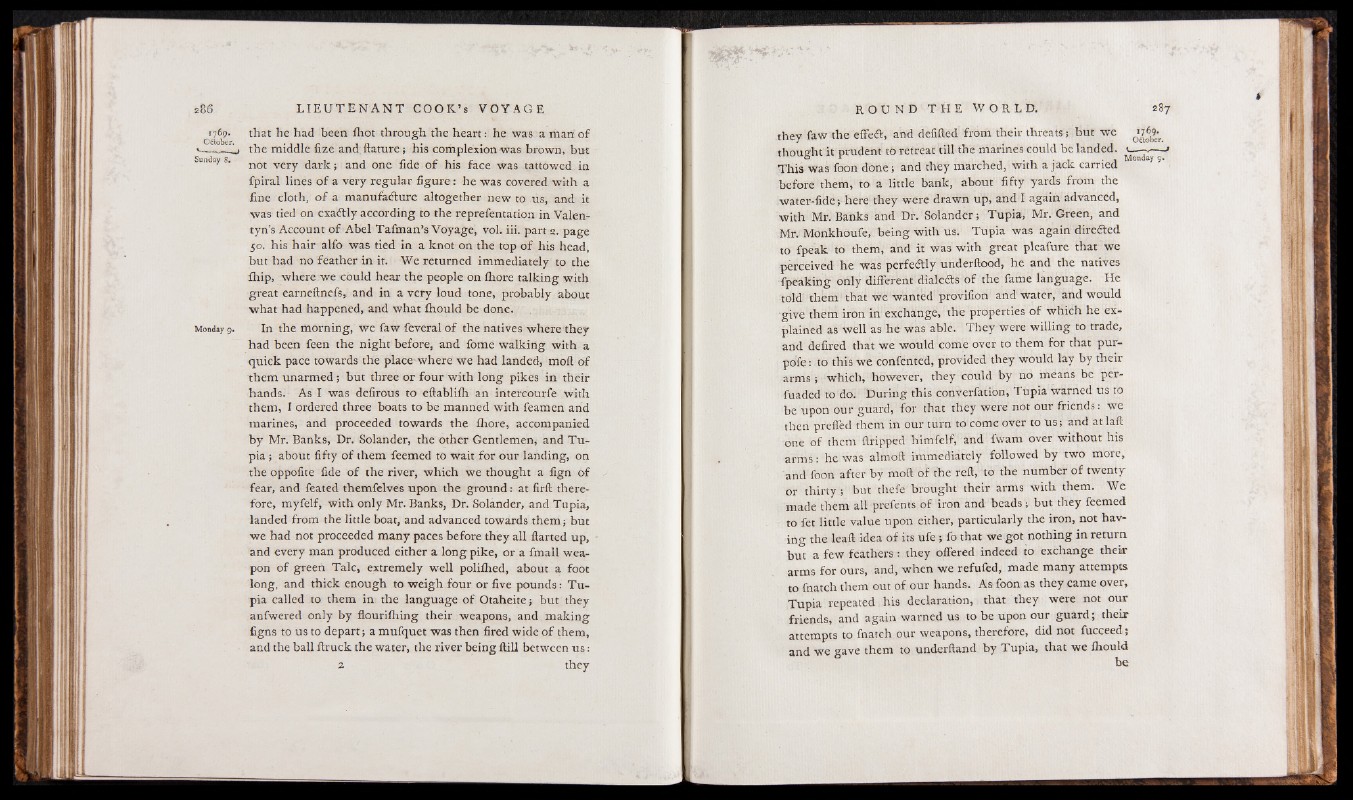
286
1769' that he had been fhot through the heart: he was a man of
«-— the middle fize and ftature ; his complexion was brown, but
Sunday 8. not very dark; and one fide of his face was tattowed in
fpiral lines of a very regular figure : he was covered with a
fine cloth, of a manufacture altogether new to us, and it
was tied on exactly according to the reprefentation in Valen-
tyn’s Account of Abel Tafman’s Voyage, vol. iii. part 3. page
50. his hair alfo was tied in a knot on the top of his head,
but had no feather in it. We returned immediately to the
fhip, where we could hear the people on fhore talking with
great earneftnefs, and in a very loud tone, probably about
what had happened, and what Ihould be done.
Monday 9. In the morning, we faw feveral of the natives where they
had been feen the night before, and fome walking with a
quick pace towards the place-where we had landed, moll o-f
them unarmed; but three or four with long pikes in their
hands. As I was defirous to eftablilh an intercourfe with
them, I ordered three boats to be manned with feamen and
marines, and proceeded towards the fhore, accompanied
by Mr. Banks, Dr. Solander, the other Gentlemen, and Tu-
pia ; about fifty of them feemed to wait for our landing, on
the oppofite fide of the river, which we thought a fign of
fear, and feated themfelves upon the ground: at firft therefore,
myfelf, with only Mr. Banks, Dr. Solander, and Tupia,
landed from the little boat, and advanced towards them; but
we had not proceeded many paces before they all ftarted up,
and every man produced either a long pike, or a fmall weapon
of green Talc, extremely well poliflied, about a foot
long, and thick enough to weigh four or five pounds: Tupia
called to them in the language of Otaheite; but they
anfwered only by flourifhing their weapons, and making
figns to us to depart; a mufquet was then fired wide o f them,
and the ball ftruck the water, the river being ftill between u s :
z they
1769.
Oftober.
Monday 9.
they faw the effeCt, and defifted from their threats; but we
thought it prudent to retreat till the marines could be landed.
This was foon done; and they marched, with a jack carried
before them, to a little bank, about fifty yards from the
water-fide; here they were drawn up, and I again advanced,
with Mr. Banks and Dr. Solander; Tupia, Mr. Green, and
Mr. Monkhoufe, being with us. Tupia was again directed
to fpeak to them, and it was with great pleafure that we
perceived he was perfectly underftood, he and the natives
fpeaking only different dialeCts o f the fame language. He
told them that we wanted provifion and water, and would
give them iron in exchange, the properties of which he explained
as well as he was able. They were willing to trade,
and defired that we would come over to them for that purpose
: to this we confented, provided they would lay by their
arms ; which, however, they could by no means be per-
fuaded to do. During this converfation, Tupia warned us to
be upon our guard, for that they were not our friends: we
then prefied them in our turn to come over to us; and atlaffc
one of them {tripped himfelf, and fwam over without his
arms: he was almofl immediately followed by two more,
and foon after by moft of the reft, to the number of twenty
or thirty ; but thefe brought their arms with them. We
made them all prefents of iron and beadsbut they feemed
to fet little value upon either, particularly the iron, not having
the leaft idea of its ufe ; fo that we got nothing in return
but a few feathers: they offered indeed to exchange their
arms for ours, and, when we refufed, made many attempts
to fnatch them out of our hands. As foon as they came over,
Tupia repeated his declaration, that they were not our
friends, and again warned us to be upon our guard; their
attempts to fnatch our weapons, therefore, did not fucceed;
and we gave them to underftand by Tupia, that we Ihould
be